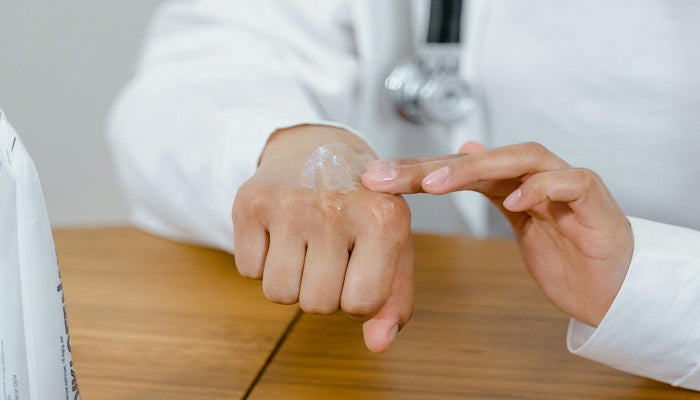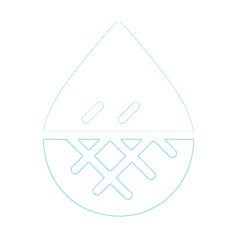What Is the Kids’ Skincare Craze?
In recent years, thanks to social media trends, the so-called “Sephora Kids” phenomenon has taken off in both the U.S. and abroad. More and more elementary and middle schoolers are showing up in beauty aisles, buying serums, exfoliants, and even anti-aging creams. For many parents, it’s both surprising and concerning.
The most common question parents ask is: “Does my child really need a skincare routine?”However, dermatologists warn that children’s skin barriers aren’t fully developed. Strong actives like acids or retinol may actually do more harm than good—leading to dryness, sensitivity, or even eczema flare-ups.
The truth is, kids don’t need expensive serums or a 10-step skincare routine. The real first step in protecting their skin is something parents often overlook: the quality of the water they bathe in every single day.

Why Children’s Skin Is More Vulnerable Than Adults’
Children’s skin is naturally more delicate and more prone to irritation. Here’s why:
Immature skin barrier
Kids’ outer skin layer is thinner and less effective at locking in moisture. This makes it easier for irritants, allergens, and even bacteria to get through.
Less natural oil production
Adults’ skin produces oils that form a natural protective film. Kids’ skin, however, is drier and lacks this shield, which leads to flakiness, itchiness, or irritation.
Higher sensitivity to harsh ingredients
Ingredients like acids, retinol, concentrated vitamin C, fragrance, or alcohol—commonly found in adult skincare—are often too strong for kids, triggering redness or eczema.
Water has a bigger impact
Hard water (rich in calcium and magnesium) and chlorine in tap water are especially tough on kids’ skin. Studies show that children in hard water areas have a higher risk of eczema.

Why Skincare Products Aren’t Always Kid-Friendly
Many parents believe that as long as they avoid using adult skincare products, choosing “children's skincare products” specifically designed for children is sufficient to ensure safety. However, in reality, both adult skincare products and some products marketed as “children's-specific” may pose risks.
Adult skincare products have overly complex ingredients
Adult skincare products often contain high concentrations of active ingredients such as alpha hydroxy acids, salicylic acid, retinol, and concentrated vitamin C. While these ingredients can help improve acne, fade dark spots, or combat aging in adults, they can easily cause irritation, allergies, or even long-term sensitivity issues in children whose skin barriers have not yet fully developed.
“Children's skincare products” do not necessarily mean safe
In recent years, with the rise of the children's skincare market, many brands have launched “children-specific” skincare products. However, some products still contain potential irritants such as fragrances, alcohol, dyes, and preservatives. Some even mimic adult skincare logic by incorporating functional formulas like whitening or anti-aging, which are not suitable for children. This not only adds unnecessary burden but may also increase skin stress. What children's skin truly needs is simple: gentle cleansing, basic moisturization, and necessary sun protection. Frequent use of functional skincare products not only fails to provide additional benefits but may also damage the skin barrier, making the skin increasingly sensitive.
Therefore, when faced with a wide array of skincare products, parents should remain vigilant: children's skincare management is not about buying more products, but about reducing irritation and minimizing burden. Instead of fixating on which “children's serum” to purchase, it is more important to address the root cause by improving the quality of the water children come into contact with most daily.

How Does Water Quality Impact Children’s Skin?
When parents are debating which skincare product to buy for their children, they often overlook a more fundamental issue: children come into contact with water more than any skincare product on a daily basis. Whether it's bathing, washing their faces, or even daily cleansing, their skin is in prolonged direct contact with tap water, and the quality of that water itself may be a key factor in causing skin issues.
Hard water makes skin more prone to dryness and sensitivity
Many American households have hard tap water, which contains high concentrations of calcium and magnesium ions. These minerals leave residues on the skin's surface, which can react with the soap-based ingredients in cleaning products to form deposits that are difficult to rinse off. Prolonged use of hard water for skin cleansing not only leaves the skin feeling dry and rough but also disrupts the skin's natural barrier function. Studies show that children living in hard water areas have a significantly higher incidence of eczema and atopic dermatitis.
Irritation from chlorine and disinfection byproducts
Chlorine, a common disinfectant in tap water, is also a burden on children's delicate skin. Chlorine strips the skin of its natural oils, causing it to lose its ability to retain moisture, resulting in itching, flaking, and even triggering recurrent eczema in children with sensitive skin.
Water quality issues are often overlooked by parents
Many parents focus on the ingredients in skincare products but overlook the fact that the first step in skincare—the water used for bathing and washing—is the most frequent point of contact for children's skin. Even if mild shower gels and lotions are used, if the water itself contains irritating substances, the skin barrier will continue to be damaged.
Therefore, the most important foundation for children's skincare is not buying another bottle of essence, but first improving water quality. By reducing the irritation caused by chlorine and hard water at the source, we can truly help children build a healthy skin barrier.

Filtered Showerhead: The First Step in Children's Skin Care Management
Once we recognize the importance of water quality for children's skin, a practical and effective solution is to use a filtered showerhead. Compared to complex skincare routines, a filtered showerhead improves the water quality children are exposed to daily from the source, offering a safer and more long-term approach to skin management.
How Does a Filtered Showerhead Work?
High-quality filtered showerheads typically use multi-layer filters (such as KDF, calcium sulfate, etc.) to intercept residual chlorine, heavy metals, and certain harmful impurities, while reducing calcium and magnesium ion content to achieve “water softening.” This means children no longer experience repeated dryness and itching due to chlorine and hard water deposits during bathing, thereby reducing the risk of eczema and atopic dermatitis.
Reduce chlorine and harmful substances
High-quality filter showerheads effectively remove residual chlorine and some disinfection byproducts from tap water, reducing skin irritation. This prevents children's skin from becoming dry and itchy due to chlorine during bathing.
Softening water quality and reducing mineral deposits
The filtration system reduces calcium and magnesium ions in water, making hard water gentler. This not only lowers the risk of eczema and atopic dermatitis but also reduces skin dryness and hair frizz.
Unlike skincare products containing complex chemical ingredients, the filtered showerhead physically improves water quality without adding extra burden to the skin. This approach is equally suitable for infants, teenagers, and the entire family. Compared to applying bottle after bottle of skincare products to children, a filtered showerhead reduces irritation from the source of bathing and cleansing, truly embodying the principle of “less is more.” It not only helps children build a healthy skin barrier but also gives parents greater peace of mind in daily care.
In other words, a filtration showerhead is not a luxury item but a long-term investment in health. It brings children's skincare back to its essence—not layering products but protecting the skin's natural barrier, truly reducing irritation from everyday details.

What’s the Best Daily Skincare Approach for Kids?
When it comes to children's skincare, “more is better” is not the correct answer. In fact, dermatologists consistently emphasize that children's skincare should be simple, gentle, and effective, avoiding the overuse of complex skincare products. The following are daily skincare recommendations combined with water quality management:
Improve water quality: Use a filtered showerhead
When children bathe or wash their faces daily, their skin comes into direct contact with tap water. The minerals and chlorine in hard water can damage the skin barrier, leading to recurring sensitivity, dryness, and eczema. A filtered showerhead effectively removes chlorine and some mineral deposits, reducing irritation at the source and providing true protection for children's skin. This step is more important than any skincare product.
Gentle cleansing
Choose facial or body cleansers for children that are free of fragrances, alcohol, and harsh cleansing agents. Avoid products labeled “deep cleansing” or containing exfoliating particles. Gentle cleansing once daily is sufficient; frequent use is unnecessary. Choose facial or body cleansers free of fragrances, alcohol, and harsh cleansing agents. Avoid products labeled “deep cleansing” or containing exfoliating particles. Gentle cleansing once daily is sufficient; frequent washing is unnecessary.
Basic moisturizing
Apply moisturizer within 3 minutes after bathing, while the skin is still slightly damp, to help lock in moisture. Choose a lightweight, non-greasy moisturizer with simple ingredients, specifically designed for children or sensitive skin. Encourage your child to apply it gently with upward strokes, paying attention to areas prone to dryness (such as elbows and knees), and gently massage until absorbed.
Moderate sun protection
If your child needs to spend extended periods outdoors, use physical sunscreens (such as those containing titanium dioxide or zinc oxide) rather than chemical sunscreens to avoid skin irritation.
Avoid excessive skincare
Do not use adult-oriented skincare steps such as whitening, anti-aging, or acid-based exfoliation on children. The focus of children's skincare should not be on “functional” benefits but on minimizing irritation and building a healthy skin barrier. Dermatologists say that simple is best. Before puberty, most children only need three things: a gentle cleanser, moisturizer, and sunscreen.
Maintain skin hydration from the inside out
Hydration comes not only from external moisturization but also from within the skin. Encourage your child to drink plenty of water throughout the day to maintain skin hydration from the inside out. It is recommended that a 10-year-old child drink approximately 6–8 cups of water daily.

Conclusion:Protecting children's skin from the source
By using a filtered shower head, you can effectively reduce the irritation caused by chlorine and hard water minerals to the skin during the daily routine of bathing, helping children maintain a healthy and moisturized skin environment. More importantly, this is not just a skincare option for children, but a lifestyle improvement solution that benefits the entire family in the long term.
The core of children's skincare is not about following adult skincare trends, but about helping children build and protect their natural skin barrier. Compared to blindly trying skincare products, improving the quality of daily bathing water is the gentlest and most effective approach.
Filtration shower heads reduce chlorine and hard water irritation at the source, preventing children's skin from becoming easily dry or itchy, thereby better maintaining healthy barrier function. For parents, this is a low-risk, high-return skin management option—no need to worry about excessive ingredients or long-term side effects.
Protecting children's skin is essentially protecting their healthy growth. And starting with water quality—the “source of skincare”—is the first step toward giving parents peace of mind and ensuring children's comfort.
Good water, gentle cleanser, basic moisturizer, sun safety, and hydration. That’s all most kids need.
Frequently Asked Questions: From Water Quality to Kid’s Daily Care
Q1: Do kids really need skincare products?
A1: Most of the time, no. Kids only need gentle cleansing and light moisturizing. Adult products often cause more harm than good. Water quality matters far more.
Q2: Why can tap water irritate kids’ skin?
A2: Tap water often contains chlorine and minerals like calcium and magnesium. These strip oils, dry out skin, and worsen eczema—especially since kids’ skin barriers aren’t fully developed.
Q3: How does a filtered shower head work?
A3: It uses filter cartridges (like carbon, KDF, or calcium sulfite) to remove chlorine, soften water, and reduce impurities. The result: gentler water that keeps skin and hair healthier.
Q4: Is a filtered shower head more effective than skincare?
A4: They serve different purposes. Skincare products repair after the fact, while filters prevent irritation from the start. For kids, prevention is often the smarter choice.
Q5: Can the whole family use it?
A5: Absolutely. Filters protect kids’ sensitive skin, improve adults’ skin and hair health, and make showers more comfortable overall.
Q6: How often should filters be replaced?
A6: Every 3–6 months, depending on your water quality and usage. Regular replacement keeps water clean and skin safe.








Leave a comment
This site is protected by hCaptcha and the hCaptcha Privacy Policy and Terms of Service apply.